A Detailed Guide to Getting a Visa During a Pandemic
It’s never fun being legally barred from entering the country you’re supposed to move to due to your own country’s poor handling of a pandemic. Truly a once in a lifetime bummer. But if you are going to go, there are a few things you should know for your visa process.
1. It takes time.
Imagine bureaucracy, but make it COVID. Everyone struggled immensely with gathering all of their documents and obtaining their visas due to the slowing of processes during the pandemic. For some people, the passport was a big one. This is obviously a key step in obtaining a visa, as the visa is a sticker that goes inside your passport. Because of travel restrictions, passport offices had effectively shut down except for emergency situations. A friend of mine had to call his local member of congress to get some strings pulled. This was no easy task, so if you have any intention of leaving the country, just go ahead and renew your passport now if you need to.
The visa also requires a background check. The state background check involves getting a fingerprint appointment, applying for the background check, and mailing it out, then getting it mailed back. I had to get an appointment to get my fingerprints at the NC State Bureau of Investigation in Raleigh, which is luckily where I live, but if you’re far from your state’s capital, you’d have to plan for a day trip. The appointments were booked out for weeks, but I called and managed to land an appointment for the next day that someone else had apparently canceled. That stroke of luck saved me weeks of waiting.
I should also mention that I ALSO applied for a federal background check and did the apostille process for that, which involved applying, getting fingerprints at the post office, and mailing that out with an enclosed return envelope. The apostille was the real kicker for so many people in the cohort, because in normal times, you might get it back in 7 to 10 days via mail, or even in the same day if you can get to Washington, D.C. in person. This year, the process was taking an average of 6 weeks or more and could only be completed by mail. I started way too late, which is why I sent off for the federal apostille AND went through the process for the state apostille at the exact same time, and just went with whichever one came back first.
I mailed out my federal apostille documents around August 7, and then applied for a state background check on August 10. The state timeline was quick, so I made an appointment to get the apostille done in person on August 18. Unfortunately, my state background check didnt make it back to me until August 24, and the next soonest appointment was September 2. Finally, I dropped off my state background check and got it back the next morning with an apostille. I walked straight to the post office with all my documents and mailed out my visa application once and for all. On September 3, just 17 days before I was originally supposed to arrive in Madrid. The program has since created a virtual orientation for folks to follow along with, and I’m planning on an October 5 arrival, in time for the latecomers orientation.
2. It adds up.
Each document that you need for a 6 month + student visa has some kind of expense, whether directly or indirectly.
The passport: luckily I had renewed my passport in 2018, but I had to get it rushed back then for another visa and it cost over $200. A passport goes for $110 regularly.
The background check: my state background check was $14, plus the cost of fingerprinting, which was $30. My federal background check was $18, plus the fingerprinting at USPS, which was $50.
The apostille: my state apostille was $10. My federal apostille was $8, plus the cost of postage and the return envelope.
The medical certificate: whatever your primary care provider charges for a wellness check-up.
The delivery: I paid around $32 for the two express-mail envelopes I had to use just to mail the documents and have the visa returned safely. If your consulate is currently taking in person visits, then you’ve got to figure out the transportation. For me, D.C. is about 4 and a half hours drive away, which would be a pretty big day trip just for a 15 minute visa appointment.
The visa fee: enclosed in your application in the form of a money order for $160.
You do the math, because I don’t want to know how much I’ve spent altogether on this.
3. Some things are out of your control.
Throughout the entire process, I felt like I had to hurry up and wait. I would rush to get all of these appointments made, documents obtained, and then I would have to mail something out or wait for another appointment and just keep twiddling my thumbs until I could take another action and move on to the next step. It’s important to keep in mind that while this process can be extremely frustrating and make you feel like you’re doing something wrong or you’re incompetent for not being able to figure this out, there are some things that are simply not in our control. Especially during the pandemic, bureaucracy is a beast before which we are pretty powerless. Any time I faced a delay or challenge, I would strategize about how to get around it or find a loophole. Sometimes I got lucky, and sometimes I didn’t. Your situation may depend on something as simple as who is answering the phone that day. Maybe they’re sympathetic and want to help you out, or maybe they’re tired, underpaid and don’t want to deal with your drama. But at the end of the day, the moments when I just let go were the only times I really knew peace throughout the entire process.
4. It will be worth it.
Beyond the eventual desired outcome (a visa that allows me into Spain), there are other things that I became more aware and appreciative of since I started this process. For one thing, I came across tons of government employees whose jobs I had never really thought about before. There were the finger printers in their white lab coats, the extremely kind woman at the post office near my house, and of course the lovely and supportive people on the program who were also in the throes of a very demoralizing battle for a visa. Although my visa has not arrived yet, I did get confirmation from the consulate that my documents had arrived and “everything looks ok.” It’s only been two weeks since the day I mailed it, which was right before a holiday weekend, but I’m expecting it any day now. I’m so relieved to be in the final phase of this process, and able to focus on other things like my orientation webinars and other final preparations. In a way, the struggle made the whole thing feel like more of a victory.
Related Posts


How to Get a Spanish Library Card in Madrid (From an Aux Who Has One)
Looking to read more books in Spanish to improve your fluency? Check out this post for an explanation on how to get a Spanish library card in Madrid as an aux.

A Weekend Guide to Riga, Latvia
After living in Latvia for a few months when I studied abroad, I've become something of a Latvia devotee. It's been three years since I moved away and still won't shut up about how good of a time I had there, so this is me just trying to share the wealth.
